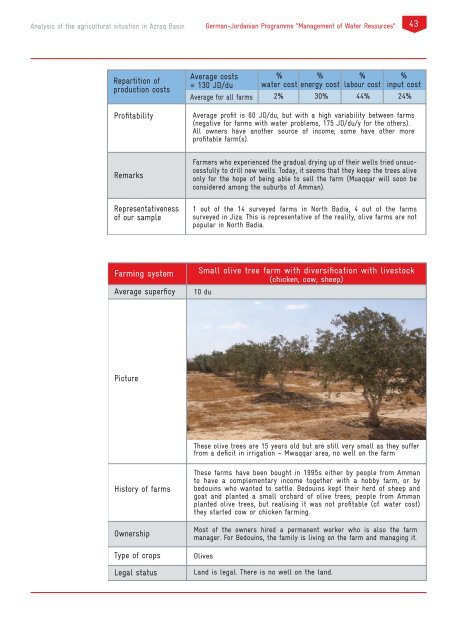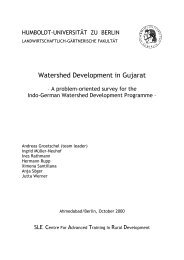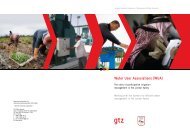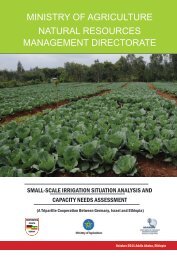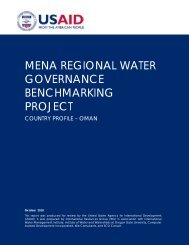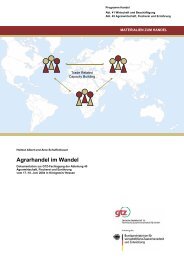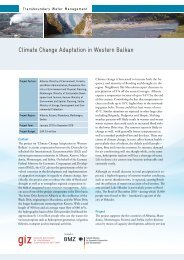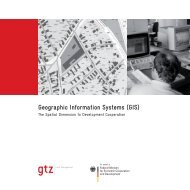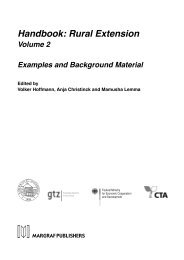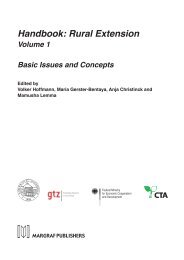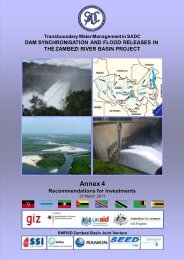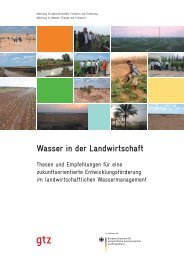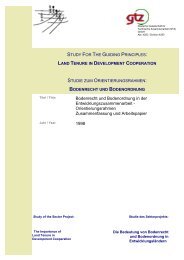Farming in the - WordPress.com
Farming in the - WordPress.com
Farming in the - WordPress.com
You also want an ePaper? Increase the reach of your titles
YUMPU automatically turns print PDFs into web optimized ePapers that Google loves.
Analysis of <strong>the</strong> agricultural situation <strong>in</strong> Azraq Bas<strong>in</strong><br />
German-Jordanian Programme “Management of Water Resources”<br />
43<br />
Repartition of<br />
production costs<br />
Average costs<br />
= 130 JD/du<br />
Average for all farms<br />
% % % %<br />
water cost energy cost labour cost <strong>in</strong>put cost<br />
2% 30% 44% 24%<br />
Profitability<br />
Average profit is 60 JD/du, but with a high variability between farms<br />
(negative for farms with water problems, 175 JD/du/y for <strong>the</strong> o<strong>the</strong>rs).<br />
All owners have ano<strong>the</strong>r source of <strong>in</strong><strong>com</strong>e; some have o<strong>the</strong>r more<br />
profitable farm(s).<br />
Remarks<br />
Representativeness<br />
of our sample<br />
Farmers who experienced <strong>the</strong> gradual dry<strong>in</strong>g up of <strong>the</strong>ir wells tried unsuccessfully<br />
to drill new wells. Today, it seems that <strong>the</strong>y keep <strong>the</strong> trees alive<br />
only for <strong>the</strong> hope of be<strong>in</strong>g able to sell <strong>the</strong> farm (Muaqqar will soon be<br />
considered among <strong>the</strong> suburbs of Amman).<br />
1 out of <strong>the</strong> 14 surveyed farms <strong>in</strong> North Badia, 4 out of <strong>the</strong> farms<br />
surveyed <strong>in</strong> Jiza. This is representative of <strong>the</strong> reality, olive farms are not<br />
popular <strong>in</strong> North Badia.<br />
<strong>Farm<strong>in</strong>g</strong> system<br />
Average superficy<br />
Small olive tree farm with diversification with livestock<br />
(chicken, cow, sheep)<br />
10 du<br />
Picture<br />
These olive trees are 15 years old but are still very small as <strong>the</strong>y suffer<br />
from a deficit <strong>in</strong> irrigation – Mwaqqar area, no well on <strong>the</strong> farm<br />
History of farms<br />
Ownership<br />
Type of crops<br />
Legal status<br />
Use of water<br />
These farms have been bought <strong>in</strong> 1995s ei<strong>the</strong>r by people from Amman<br />
to have a <strong>com</strong>plementary <strong>in</strong><strong>com</strong>e toge<strong>the</strong>r with a hobby farm, or by<br />
bedou<strong>in</strong>s who wanted to settle. Bedou<strong>in</strong>s kept <strong>the</strong>ir herd of sheep and<br />
goat and planted a small orchard of olive trees; people from Amman<br />
planted olive trees, but realis<strong>in</strong>g it was not profitable (cf. water cost)<br />
<strong>the</strong>y started cow or chicken farm<strong>in</strong>g.<br />
Most of <strong>the</strong> owners hired a permanent worker who is also <strong>the</strong> farm<br />
manager. For Bedou<strong>in</strong>s, <strong>the</strong> family is liv<strong>in</strong>g on <strong>the</strong> farm and manag<strong>in</strong>g it.<br />
Olives<br />
Land is legal. There is no well on <strong>the</strong> land.<br />
As <strong>the</strong>re is no well on <strong>the</strong> land, water is bought from neighbor<strong>in</strong>g<br />
farms for 0.7 JD/m 3 . As water is very expensive, consumption is<br />
reduced to <strong>the</strong> m<strong>in</strong>imum (180 m 3 /du/y) and just allows olive trees to<br />
give little olives used mostly by <strong>the</strong> family.<br />
Water accounts for more than 50% of production costs.


